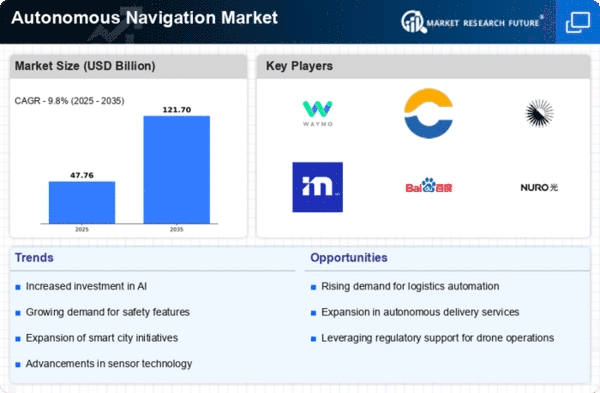Top Industry Leaders in the Autonomous Navigation Market

Strategies Adopted: Key players in the Autonomous Navigation Market employ various strategies to maintain their competitive edge and capitalize on market opportunities. These strategies include:
Technological Innovation: Companies invest heavily in research and development to develop advanced sensor technologies, artificial intelligence algorithms, and navigation systems capable of enabling safe and efficient autonomous driving across different environments and conditions.
Strategic Partnerships and Collaborations: Collaborations with automotive manufacturers, technology partners, regulatory authorities, and industry stakeholders help companies access new markets, expand their product portfolio, and address regulatory and safety concerns associated with autonomous navigation.
Focus on Safety and Reliability: Companies prioritize safety and reliability in autonomous navigation systems, implementing redundant sensors, fail-safe mechanisms, and rigorous testing and validation processes to ensure safe operation and build trust among consumers and regulators.
Customer-Centric Approach: Companies focus on understanding customer needs, preferences, and pain points to develop user-friendly interfaces, intuitive controls, and personalized services that enhance the overall user experience and drive adoption of autonomous navigation technologies.
Key Players:
Collins Aerospace (US),
Thales Group (France),
Rolls-Royce (UK),
Honeywell International Inc. (US),
ABB (US),
Kongsberg Group (Norway),
Trimble Inc. (US),
Northrop Grumman Corporation (US),
L3 Technologies, Inc. (US),
General Dynamics Corporation (US),
Raytheon Company (US),
Moog Inc. (US),
Furuno Electric Co., Ltd (Japan),
Safran (France),
RH Marine (Netherlands)
Factors for Market Share Analysis: Several factors contribute to the analysis of market share in the Autonomous Navigation Market, including:
Technology Leadership: The technological prowess, innovation capabilities, and intellectual property portfolio of companies play a critical role in determining market share, with companies pioneering breakthroughs in autonomous navigation technologies gaining a competitive advantage.
Market Presence and Partnerships: The geographical presence, market reach, and strategic partnerships of companies influence market share, with companies having a global footprint and strong alliances with automotive OEMs and technology providers enjoying a competitive edge.
Regulatory Compliance and Certification: Compliance with regulatory requirements, standards, and certifications, such as ISO 26262 for functional safety and SAE J3016 for levels of automation, is essential for gaining market share and winning customer trust in the autonomous navigation market.
Consumer Perception and Adoption: Consumer acceptance, trust, and adoption of autonomous navigation technologies play a crucial role in market share analysis, with companies offering reliable, convenient, and affordable autonomous driving solutions gaining market share in the long run.
New and Emerging Companies: In addition to established players, new and emerging companies are entering the Autonomous Navigation Market, bringing innovative technologies and business models. These companies often focus on niche segments or disruptive approaches, challenging traditional players and driving innovation in the industry. Some notable new and emerging companies in the market include:
Zoox Inc.
Aurora Innovation Inc.
Nuro Inc.
TuSimple Inc.
Pony.ai Inc.
Voyage Auto Inc.
Industry News and Current Company Investment Trends: Recent developments and investment trends in the Autonomous Navigation Market reflect a growing focus on scalability, commercialization, and regulatory readiness. Key highlights include:
Commercial Deployment of Autonomous Vehicles: Companies are ramping up efforts to deploy autonomous vehicles for commercial use cases, such as ride-hailing, goods delivery, and last-mile logistics, demonstrating the feasibility and scalability of autonomous navigation technologies.
Investment in Simulation and Testing: Companies are investing in simulation and testing platforms to accelerate the development and validation of autonomous navigation systems, enabling virtual testing of millions of scenarios and reducing the time and cost of real-world testing.
Regulatory Engagement and Standards Development: Companies are actively engaging with regulatory authorities and industry consortia to establish common standards, guidelines, and best practices for autonomous navigation, addressing safety, liability, and interoperability concerns.
Diversification of Business Models: Companies are exploring new business models, such as mobility-as-a-service (MaaS), subscription-based autonomous vehicle platforms, and data monetization strategies, to capture value beyond hardware sales and differentiate themselves in the market.
Overall Competitive Scenario: The Autonomous Navigation Market is highly competitive, characterized by technological innovation, strategic partnerships, and regulatory compliance. Established players leverage their experience, expertise, and ecosystem partnerships to maintain market leadership, while new entrants disrupt the market with innovative solutions and business models. As the industry continues to evolve, companies that focus on safety, reliability, scalability, and customer-centricity will thrive in the competitive landscape of the Autonomous Navigation Market.
Recent Developments
In May 2017, the US Navy signed a contract worth USD 28.0 million with the prominent market player Raytheon with an aim to supply variable depth sonars. It is especially proposed for its littoral combat ship class.











